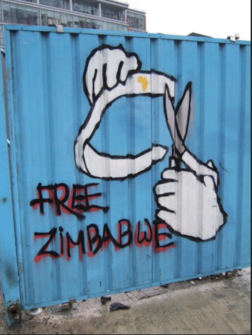
While reading When Politics Are Sacralized: Comparative Perspectives on Religious Claims and Nationalism, I was drawn to compare the arguments of some of the contributors to the book to the recent political situation in Zimbabwe, on which I have conducted extensive research. Zimbabwe gained independence in 1980 following a protracted war of liberation against Great Britain. The liberation war was fought with a nationalist ideology as its motivating force and Zimbabwe today is constitutionally a secular state. However, like in India, as Tanika Sarkar shows in this book, true secularization in Zimbabwe is difficult to imagine because the society continues to be highly religious, and religion and politics intertwine. Political elites often appeal to either Christianity or African religion to ground their nationalist positions.
What follows from the arguments presented in the book and my own reflection on the Zimbabwean context is that the fusion of religion and nationalism is not a necessary outcome. Rather, fusing the two is an instrument used by political elites to justify and legitimate particular political policies, actions, and imaginaries. This proposition converges with Amnon Raz-Krakotzkin, Nadim N. Rouhana, and Yaacov Yadgar’s assertions in the book. They show how religion and nationalism—or religion and the state—are connected, and how religious terms are deployed to legitimate and establish entitlement to land and settler colonialism. As Yadgar points out in the book, when dominant religious traditions cease to serve political purposes, new ones are invented (Hobsbawm and Ranger, The Invention of Tradition).
The Construction of Religious Justification: Iran and Zimbabwe
The religious justification for political processes are often invented and/or constructed by those with political aims. As Yadgar again points out in his chapter, the language used in the conflation of religion and nation is deliberate and not neutral. A good example that demonstrates that there is nothing necessary about using religious claims in pursuit of political ends can be found in the history of modern Iran, which Ali Banuazizi describes in his chapter. Under the reign of two monarchs in the twentieth century (1925–41 and 1941–79), religion was undermined in favor of nationalism. This changed after the revolution in 1979 when Iran became an Islamic republic. When the war with Iraq (1980–88) intensified, however, the regime again relied on nationalist propaganda. The lesson we might take from Banuazizi is that how religion and nationalism relate depends on the political interests of those drawing on them. Both religion and nationalism ultimately serve the same purpose, namely political mobilization and state legitimacy.
In Zimbabwe, political elites often invoke African religion and Christianity to similar ends. The link between African religion, Christianity, and nationalism dates to the liberation struggle of the 1970s. It persisted during Zimbabwe’s two republics, from 1980 to 2017, under the late President Robert Mugabe, and has continued into the present under President Emmerson Mnangagwa. What makes religion so powerful and compelling in this context is that it dogmatically sacralizes, and thus provides an absolute and non-negotiable quality to, policies and actions. Sacralization thus closes off debate over policies.
African Independent Churches and Nationalism in Zimbabwe
An example of this sacralization is the fusion of African Independent Churches (AICs) with nationalism in Zimbabwe. AICs provided a sacred canopy to the policies and actions of the Zimbabwe African National Union-Patriotic Front (ZANU PF) under then-President Robert Mugabe—who held office from 1987 to 2017—and continue to do so in the present under President Emmerson Mnangagwa. The arguments that emerged from the churches were colonial critiques that protested against all kinds of oppression (Isabel Mukonyora, “Religion, Politics, and Gender in Zimbabwe,” 146).
The fusion between religion and nationalism is not inherent or necessary. It is an instrumentalist relationship that is used to justify and legitimate particular political policies, actions, and imaginaries.
In post-colonial Zimbabwe, most of the churches endorsed the Zimbabwe African National Union-Patriotic Front (ZANU PF) and Mugabe, who was then its leader. This was because of the ideological convergence of their messages with the political aspiration for independence, indigenization, and sovereignty. To this day, AICs have become dependable support bases even as ZANU PF’s urban support has gone down (Ibid., 137). Thus, instead of pursuing social justice, they have prioritized loyalty to the individuals and movements they supported during colonial times, even as the latter has engaged in practices similar to those of colonial governments. This confirms my proposition that the fusion between religion and nationalism is not inherent or necessary. It is an instrumentalist relationship that is used to justify and legitimate particular political policies, actions, and imaginaries.
Religious Rhetoric in Zimbabwe’s Politic
As Peter Berger notes in The Sacred Canopy, “religion legitimates social institutions by bestowing an ultimately valid ontological status, which is locating them within a sacred and cosmic frame of reference” (33). People take the sacred to be the absolute, normative reality that exerts an unquestionable claim on the conduct of social life (Gordon Lynch, The Sacred in the Modern World). Religious legitimation involves transforming human products into supra- or non-human products: the humanly made world is explained in terms that deny its human production (Berger, 89). In the early 2000s, the regime used religious rhetoric to seize land and mobilize for land redistribution.

To give a concrete example, the government ran an advertisement on television which went as follows: “In the beginning, was the land. The people were on the land. The people owned the land. As it was in the beginning, so shall it always be. Welcome to Zimbabwe. We are down to earth.” The land question was ideologically linked to the creation story of Genesis 1 (Ezra Chitando, ‘“In the Beginning was the Land,’” 224). Mugabe was likened to the biblical Moses who delivered people to the Promised Land. His leadership was depicted as fulfilling a divine prophecy. The government also appealed to Indigenous religion. President Mugabe was said to be acting in accordance with the demands of the ancestors and obeying ancestral oracles (see Mukonyora, 137).
While the mainline churches, including the Catholic church, as well as many Protestant churches may not always be as direct as the AICs in enabling the ruling regime, they have also been a part of this fusion. When postcolonial Zimbabwe found itself in a situation of political instability, the mainline churches responded with diplomacy and rationalization, addressing peoples’ need for order and engagement through ritualistic theological and pastoral statements. The stance of the mainline churches and apex bodies works in favor of political elites. It allows no change of order or political system. This corresponds to what the book captures about Israel, Iran, and India and Berger’s assertion (Berger, 59) that religious positions may function to legitimate a particular institutional order. This however does not mean that there are not any non-conformist religious actors from the institutional churches (Joram Tarusarira, Reconciliation and Religio-political Non-conformism in Zimbabwe).
Selective Application of the Policy on Religion
What also emerges from reading the book and reflecting on Zimbabwe is that political elites selectively apply the policy of religious freedom. They form an alliance with religious actors who support them and condemn those that challenge them. Thus, in the process, they define what is good or bad religion and how religious actors should participate in politics.
Political elites selectively apply the policy of religious freedom. They form an alliance with religious actors who support them and condemn those that challenge them.
They restrict religious actors who criticize them as holding only humanitarian and/or social roles rather than as critical contributors to political issues. In other circumstances, they co-opt other church denominations so that they can also provide them with a sacred canopy. This compromises what Francis Verstraelen sees as the ideal attitude of the church: to exercise a prophetic mission, denouncing policies of injustice perpetrated by governments and standing up in support of the poor, rather than remaining neutral, which itself is also to be co-opted or to require accepting compromises.


Good stuff this Joram. Cheers